welsh.ng.2
WELSH NARROW GAUGE RAILWAYS
1955 – 2017
PART 2 – The North
over one hundred
photographs of the
Ffestiniog and Welsh Highland Railways
also the
Snowdon mountain and Great orme lines
All photographs taken by and © Robert and Barbara
Darlaston
Part One of this story
(covering mainly the Talyllyn, Welshpool &
Llanfair and Vale of Rheidol lines) can be found at www.robertdarlaston.co.uk/welsh.ng.htm
1: The Ffestiniog
Railway
Brief history:
First
era:
Incorporated
by Act of Parliament as the Festiniog Railway
Company, 25th May 1832, in the reign of King William IV
Opened
for goods traffic Porthmadog – Blaenau Ffestiniog, 13 miles, 20th April 1836
(horse-power and gravity operation)
Steam
locomotives introduced 1863
Passenger
services commenced 4th January 1865
Passenger
services withdrawn 15th September 1939
Goods
services ceased and railway out of use 2nd August 1946
Second
era:
Re-opened
as preserved line: first section, Portmadoc – Boston Lodge 23rd July 1955
Operations
extended gradually as sections of line re-opened, 1956 - 1982
Re-opening
completed throughout to Blaenau Ffestiniog 25th
May 1982
The Festiniog Railway
Company is the oldest railway company in the world
Boston Lodge Works is the oldest railway works in the
world still used for its original purpose
1:
Preservation;
the Early Years
Scenes from 1955 – 1961

On 23rd July 1955 a passenger service was restored from Portmadoc* for a mile across the Cob to Boston Lodge, initially using a
Simplex petrol engine first built for service in France in the First World War. Restoration of 0-4-0 no 2 Prince, built in 1863,
was completed in time for service on 3rd August. The photograph above shows Prince at Portmadoc with the 11.30 to
Boston Lodge on 16th August 1955. Prince was then a mere 92 years old and continues in service in 2018.
* Porthmadog was then spelled thus.


Left: The unrestored line towards Minffordd at Boston Lodge on 16th August 1955.
Right: Prince and train at Boston Lodge on 18th August 1955. Party of Lancashire ladies at the right!


Two scenes at Boston Lodge works.
Left: the remains of loco no 4 Palmerston in 1958.
Right: Double Fairlie loco no 10 Merddin Emrys stored in the shed at Boston Lodge in 1957 (former hearse van to the right).
Both locos have subsequently been returned to service.


By summer 1957 the line had been reopened as far as Penrhyn, four miles from Portmadoc.
Left: A view from the carriage window at Portmadoc as Prince backs onto the 2.30 pm to Penrhyn on 21st August 1957.
Right: Prince is running round the train at Penrhyn prior to returning to Portmadoc on 21st August 1957.
In both pictures it can be seen the track has had only the minimum necessary maintenance!

Minffordd on13th September 1958 with 0-4-0 no 2 Prince about to leave with the 10.40 to Tanybwlch
The line to Tanybwlch had been reopened on 5th April 1958.


Two scenes showing wagons in use in September 1958.
Left: the Cleminson six-wheeled wagon at Portmadoc, then in use for conveying loco coal from the B.R. transfer siding at Minffordd.
Right: In 1958 slate was being taken by road from the quarries at Blaenauu Ffestiniog for onward carriage by British Railways Western Region.
In course of transfer from road to rail at Minffordd, the slate was moved about the yard in F.R. wagons as seen here.
(3-ton slate wagons 826, 956 and 853 are being so employed in the photograph).

No 2 Prince approaches Tanybwlch with the 4.30 pm from Portmadoc on 13th September 1958.

Tanybwlch station on 13th September 1958 showing Prince with the 5.30 pm to Portmadoc.
Note Station Mistress Bessie Jones in the cottage doorway, wearing her Welsh costume.


Views on the disused portion of the line in September 1958:
Left: the north end of Garnedd tunnel
Right: Dduallt station looking towards Portmadoc.


Left: Tanygrisiau station, looking south.
Right: Glan-y-Pwll junction with the disused line to Blaenau Ffestiniog Central and Duffws to the right in 1958. The line to Dinas once went
straight ahead and a quarry siding led off to the left.


Left: The site of the exchange passenger station with the LNWR in 1961
Right: the inclines to the quarries beyond Duffws station in 1958. These tracks were still in use for transferring slate from the quarries to
the exchange sidings with British Railways (both LMR and WR stations). Note the derailed wagon dumped at the left.

Blaenau Ffestiniog Central on 22nd January 1961 showing the last train over the Great Western branch from Bala Junction
(locos 4645 and 8791). At the left is the F.R. line from Portmadoc to Duffws and the quarries. To the right is the F.R. line to
the former G.W.R. exchange sidings.
2: Scenes from 1970 – 1982

Blaenau Ffestiniog Central in 1978, viewed from much the same point as the 1961 photo above.
All former F.R. narrow gauge tracks have been removed. The only railway track remaining is the B.R. freight line to
Trawsfynydd nuclear power station.


Left: Prince leaves Portmadoc in 1980
Right: ex-Penrhyn Quarry locomotive Linda sets off from Minffordd to Portmadoc.

A general view of Boston Lodge Works in 1965 with the main line in the foreground.
The works chimney is still in situ.

Linda arrives at Tanybwlch with a train to Tanygrisiau in 1980

The view from the train above Tanybwlch in 1980, looking over Llyn Mair


On 6th April 1968 a further stretch of line from Tanybwlch to Dduallt was reopened while work continued to build a new diversionary route to
by-pass the reservoir which flooded part of the old route.
Left: Ex-Penrhyn Quarry loco Blanche waits at Dduallt before returning to Portmadoc in 1968.
Right: Work is in progress in 1968 building the spiral at Dduallt to gain height for the line to by-pass the reservoir


Dduallt after completion of the deviation:
Left: trains pass at Dduallt with double Fairlie locomotives Earl of Merioneth (left) and Merddin Emrys (right).
Right: the view from a train climbing the spiral in 2015, near the location in the 1968 photograph above.

A train hauled by diesel locomotive Vale of Ffestiniog in the mountains on the diversionary route above Dduallt in 2000


Left: Tanygrisiau station with a train for Porthmadog in 1978. At that time, Tanygrisiau was the temporary terminus of the line.
Right: A view down to Tanygrisiau in 1980, showing the reservoir which blocks the original course of the line, and (left of the reservoir)
a train waits in Tanygrisiau station
3: Back to Blaenau in 1982

The Vale of Ffestiniog, seen from the train south of Tanybwlch station

Work in progress at Blaenau Ffestiniog, early 1982.
The new British Rail station is at the right.

The headboard fitted to the inaugural train to
Blaenau Ffestiniog on 25th May 1982.
The loco is Earl of Merioneth, built at Boston Lodge in 1979
and withdrawn from service in 2018.


Blaenau Ffestiniog, 25th May 1982:
Scenes with the inaugural train with loco Earl of Merioneth.


Left: An off-peak-season train arrives at Blaenau Ffestiniog in April 1984, hauled by small diesel locomotive
Upnor Castle, built for the Royal Navy in 1954. The train is near the site of the original exchange station for the LNWR line.
Right: the same train, heading back from Blaenau Ffestiniog towards Tanygrisiau.
4:
A journey up the line in the 21st Century


Left: Celebrating the 150th anniversary of the introduction of passenger services in 1865, Prince is flagged away from Porthmadog
by Alan Pegler (in wheelchair). Mr Pegler was a principal contributor to the acquisition of the railway by preservationists in 1954.
Right: A glimpse of the interior of Prince’s cab.


Porthmadog station, seen in 2007 (left) and 2016, showing the additional island platform and signal box installed to allow
Welsh Highland Railway trains to use the station.

Boston Lodge Works, seen from the end of the Cob in 2005 with a diesel shunter manoeuvring slate wagons


Inside Boston Lodge Works in 2005.
Double Fairlie locomotive David Lloyd George receives attention

Double Fairlie locomotive no. 10 Merddin Emrys receives attention outside the Works in 2005.
The loco is in temporary black livery following a major overhaul. Merddin Emrys was built at Boston Lodge in 1879.

Double Fairlie Earl of Merioneth (built in 1879) leaves Minffordd with a train from Blaenau Ffestiniog to Porthmadog in 2016.
Minffordd station is an interchange station with the Cambrian Coast line, served by trains from Pwllheli to Shrewsbury and Birmingham.

Double Fairlie number 10 Merddin Emrys heads away from Tanybwlch en route to Porthmadog in September 2018.
The loco was built at the company’s Boston Lodge Works in 1879. The cast iron bridge it is crossing was constructed at
Boston Lodge in 1854. The works is still busy and the Observation Car behind the loco was built there in 2015.
Boston Lodge works is the oldest railway works in the world still used for its original purpose, part dating back to 1811
with much of the rest dating from the 1840s.


Change at Tanybwlch:
The station from the same viewpoint in 1965 and 2015


Left: Tanybwlch in 2013: Earl of Merioneth arrives with a train for Blaenau while replica Lynton & Barnstaple Railway Lyd waits
to depart for Porthmadog.
Right: A train passes the Cwmorthin Falls at Tanygrisiau in 2007.

The view from the Observation Car at the rear of a train heading for Blaenau Ffestiniog in 2015.
The train is near Dduallt, offering a view of the Vale of Ffestiniog at the left.

The view from the train near Dduallt station

A train from Porthmadog approaches Tanygrisiau behind a double Fairlie locomotive in 2016


Two views showing a train from Blaenau Ffestiniog leaving Tanygrisiau in September 2018

Blaenau Ffestiniog station on a sunny day in 2015.
The photograph is taken from much the same position and is looking in the same direction as those taken in 1961 and 1978 (further above).
A Conwy Valley line train to Llandudno is standing in the main line station.

More customary weather conditions at Blaenau!
Double Fairlie loco Merddin Emrys is running round his train before returning to Porthmadog. National Rail tracks at the right.
2: The Welsh Highland
Railway
Brief history:
1877 - 1922
Original main line opened (as North Wales Narrow Gauge Railway), Dinas Jc – Quellyn (6 miles), plus branch to Bryngwyn, 1877
Extended from Quellyn to Rhyd Ddu (3 miles further) 1881
Various abortive proposals to extend line via Beddgelert to Portmadoc and from Beddgelert to Betws-y-Coed, 1870s - 1914
Passenger services temporarily withdrawn, 1st November 1916 (goods services continued to operate).
1922 -1941
Welsh Highland Railway (Light Railway) Company incorporated to take over and extend line, 1922
Line extended 12 miles from Rhyd Ddu to Portmadoc via Beddgelert, with passenger services through from Dinas Jc, 1st June 1923
Passenger services withdrawn Dinas Jc – Portmadoc, 28th Sept 1936
Goods services withdrawn and line closed throughout, 31st May 1937
Line dismantled, 1941. N.B. The Welsh Highland Railway company remained in existence and could not be wound up nor the
trackbed sold without a costly Abandonment Order which the company could not afford.
Abortive schemes to reopen part of line as a tourist attraction, 1964 - 1990
1990 onwards
Festiniog Railway Company obtains effective control of W.H.R. Co. with intention to reopen the line and to include the former
British Railways line between Dinas Jc and Caernarfon, May 1990.
W.H.R. passenger services commenced from Caernarfon to Dinas (i.e., on 3 miles of former B.R. route only), 13th October 1997.
Former W.H.R. route, Dinas to Waunfawr, 4 miles, reopened 7th August 2000 and extended 6 miles to Rhyd Ddu on 13th August 2003.
Line extended 6 miles via Beddgelert and Aberglaslyn Pass to Hafod y Llyn, April/May 2009.
“Golden Spike” ceremony at Porthmadog to celebrate joining of the W.H.R. and Ff.R., 28th February 2009. (Photos below).
Commencement of through services over 25 miles from Caernarfon to joint station with Ffestiniog Railway at Porthmadog, 19th Feb 2011.



The Golden Spike ceremony at Porthmadog on 28th February 2009
A TRIP ALONG THE LINE,
STARTING AT PORTHMADOG

Porthmadog Harbour station, Ffestiniog Railway, on 28th February 2009, the day of ‘formal completion’ of the link between
Caernarfon and Porthmadog. WHR Garratt loco 87 at left, FR Palmerston at right.

The new platform at Porthmadog Harbour station with Earl of Merioneth on a train to Blaenau Ffestiniog (left)
and WHR Garratt 87 on a train to Caernarfon (right), July 2014.


Street scenes in Porthmadog:
Left: a train from Caernarfon joins the main road to cross Britannia Bridge as it approaches Harbour station in July 2012.
Right: a train for Caernarfon sets out from Porthmadog


The WHR in Porthmadog, on 28th February 2009 before restoration of services:
Left: the site of the former WHR Portmadoc New station with remains of the water tower at the left.
Right: The crossing of the WHR line (straight ahead) and National Rail’s Cambrian Coast line (left to right)


Left: inside the WHR Pullman saloon Bodysgallen
Right: our train is halted by signals at the site of the former WHR Portmadoc New station while it waits
for a Pwllheli – Birmingham International train to cross in front on the Cambrian Coast line


Left: View from the train about to cross the River Glaslyn at Pont Croesor, with Snowdon in the distance (March 2012)
Right: a train from Caernarfon seen near Pont Croesor with Cynicht in the background (Sept 2015)
IN THE ABERGLASLYN PASS

No. 143, originally built by Beyer Peacock in Manchester in 1958 for South African Railways.
Coupled next to 143
is the Pullman Observation Car Glaslyn
which gives fine views of the line, especially when at the rear of the
train. The railway employs two further
Beyer-Garratt locomotives, 87 and 138, also repatriated from South Africa and
retaining their SAR numbers. They are
the most powerful 2’ gauge locomotives in the world, weighing 62 tons and
capable of hauling 12 carriages up the four miles of 1 in 40 gradient out of Beddgelert.

A train seen in the Aberglaslyn Pass as it heads towards Beddgelert en route to Caernarfon

Another view of the train alongside the River Glaslyn

The view from a train in the Aberglaslyn pass, heading towards Porthmadog
Inset: the same location, photographed in 1955, showing a war-time machine gun emplacement by the tunnel mouth


Left: No 87 (in blue livery) heads towards the pass with a train for Porthmadog in 2012
Right: No 87 in earlier grey livery about to cross the Glaslyn Bridge when heading for Caernarfon in 2009


Left: A train for Porthmadog alongside the River Glaslyn behind 2-4-0ST Linda and Double Fairlie Earl of Merioneth in 2016
Right: A Beyer-Garratt loco takes water at Beddgelert before starting the climb to Rhyd Ddu, en route to Caernarfon
BEDDGELERT STATION - then and now


The Goat Cutting in 1965 (left) and in 2012 with a train leaving for Porthmadog


Beddgelert station looking south in 1965 and 2017.
Note that the WHR water tower support still survived and has been restored to use


Left: In October 2007 work was well in hand to restore the station.
Right: ten years on and everything is spick and span with even the old water tower (right of centre) back in use

Beddgelert station in 2017, looking south.
A Porthmadog – Caernarfon train is arriving (left) while a train to Porthmadog waits at the right

Immediately after leaving Beddgelert, trains to Caernarfon enter a series of reverse curves to gain height to climb towards Rhyd Ddu.
By road the journey is 3.2 miles and takes six minutes – by train it is 33% further and takes 25 minutes: a disadvantage which
contributed significantly to the failure of the passenger service in the 1930s, but today’s tourists welcome the scenic delights!
In the photograph above, taken in 2012, Moel Hebog (2566’) looms over the railway as No. 87 sets off towards Caernarfon.

A train from Caernarfon to Porthmadog approaches Beddgelert in September 2018
SCENES AT RHYD DDU AND NORTH TO CAERNARFON


Left: 143 waits in Rhyd Ddu station with a train for Caernarfon. Taken in 2003 when Rhyd Ddu was the terminus.
Right: A train arrives from Porthmadog (left) while another takes water (right)

143 leaves Rhyd Ddu with a train for Caernarfon in 2006. Mynydd Mawr is in the background.

Ex-Penrhyn Quarry Railway Blanche and Double Fairlie Merddin Emrys leave Rhyd Ddu in February 2011 with a train for Caernarfon

The view from a train heading for Porthmadog as it approaches Rhyd Ddu behind no 143 in September 2012


Left: Climbing towards Moel Hebog
Right: Llyn Cwellyn, seen from the rear of a train bound
for Porthmadog

With


Left: A train for Caernarfon, about to cross the Gwyrfai River near Plas-y-Nant
Right: A train near Salem

Waunfawr station with 138 on a train for Caernarfon in 2003


Two scenes at Dinas station in 2006;
Left: A general view looking towards Caernarfon. These two platforms were originally served by trains of the LNWR line from
Caernarfon to Afon Wen (closed in 1964) and WHR trains ran to the right of the building (an original NWNGR building dating from 1877).
Right: FR 0-4-0ST no. 4 Palmerston (built 1863) simmers quietly at Dinas in 2006.
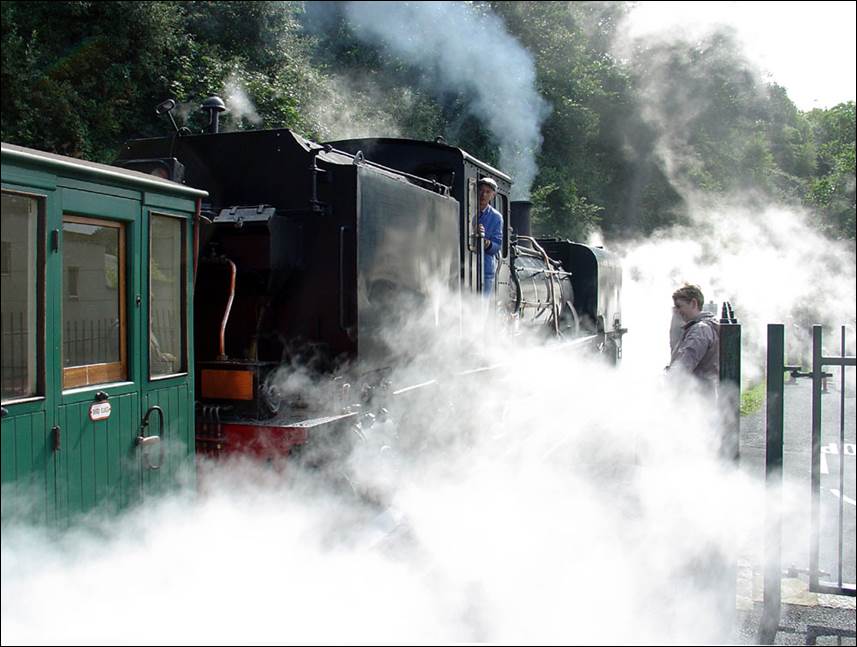
Steamy departure from Caernarfon in 2009

Caernarfon station on 18th May 2016 with the castle in the background.
Loco 143 has just been overhauled and made its initial trial run from Dinas to Caernarfon. There it was attached to 87 for the return run.
3: The Snowdon
Mountain Railway
Opened 6th April 1896. Closed next day following a serious
derailment and reopened on 19th April 1897.
Climbs for almost five miles and over 3000 feet from Llanberis to Snowdon Summit station (3510’),
using the
Abt Rack system with gradients up to 1 in 5.5.

A train seen shortly after leaving Llanberis in 1982


Left: Loco 8 Eryri (built in Switzerland in 1923) at Llanberis in 1970
Right: Locos outside the shed at Llanberis in 1970
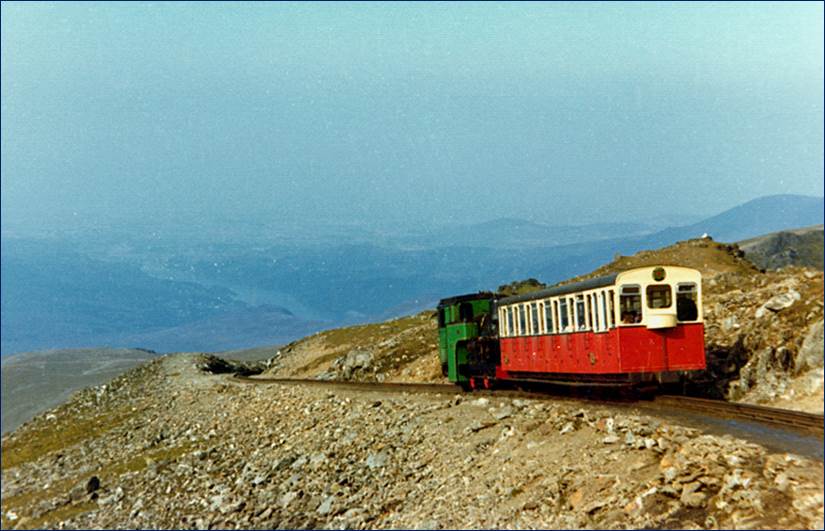
A train approaches the summit station in October 1972
Llyn Padarn is just visible through the haze
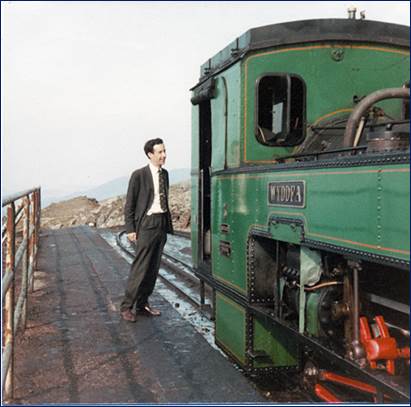
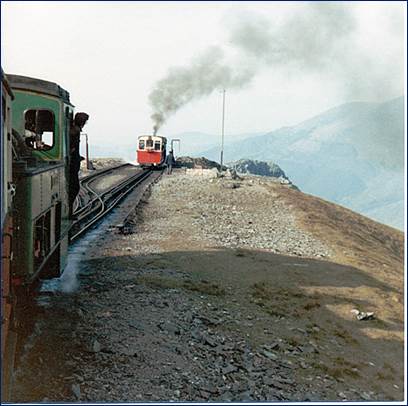
Left: Loco No 3 Wyddfa (built in Switzerland in 1895) at the summit station in October 1972
Right: A view from the train descending Snowdon and about to pass a train climbing to the summit in October 1972
4: The Great Orme
Tramway
Opened 1902. A cable operated line in two sections totalling 1˝ miles.
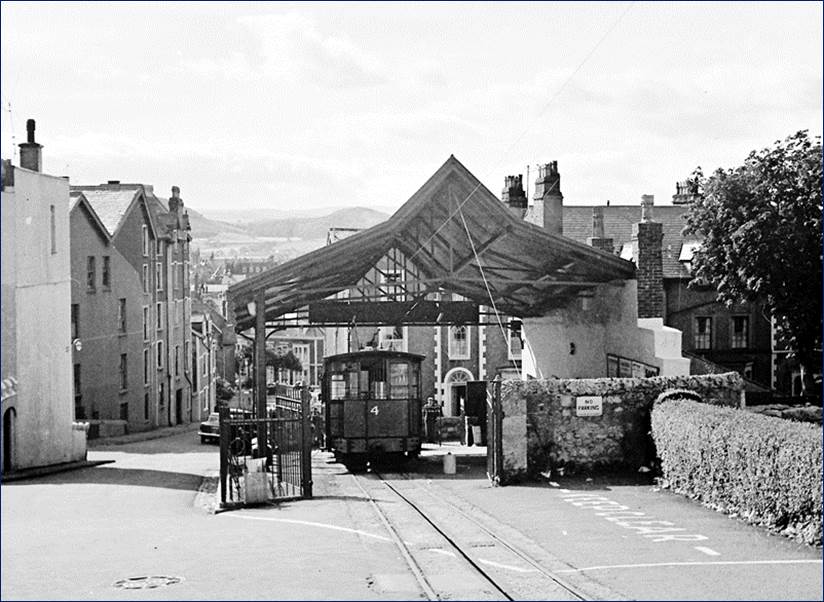
The line’s Victoria terminus at Llandudno in 1965
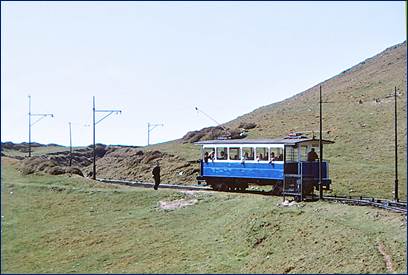
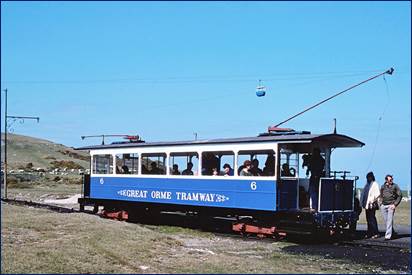
Two scenes showing cars on the upper section of the line in 1982
* * * * *
The first part of my review of Welsh Narrow Gauge Railways, covering mainly the Talyllyn, Welshpool & Llanfair and Vale of Rheidol lines, can be seen at www.robertdarlaston.co.uk/welsh.ng.htm .
My other railway pages can be
accessed by clicking on the links below:
Railways.htm (Photographs taken in the 1950s, train
spotting at Birmingham Snow Hill in 1953, and scenes in the West Midlands and
South Wales 1953 – 1962)
Railways50yr.htm (A selection of photos from the 1950s: West Midlands,
Railways2.htm (Brecon and -Mid-Wales; the Somerset & Dorset line, GWR and LSWR lines in Somerset, Devon and
Cornwall: all 1957-1962)
Railways3.htm (the
Railways4.htm (Birmingham area LMR; glimpses of Boston, Peterborough, and
Lincoln; GWR lines in North Wales; a few shots on the Southern: all 1961-1963)
Trams.htm
(the last days of
My Chronology of
events, including opening and closure dates, relating to the Railways of the
West Midlands from 1954-2017 can be accessed from these links:
RAILWAYS of WEST MIDLANDS pt 1. (1954-1974)
RAILWAYS of WEST MIDLANDS pt 2. (1975-1993)
RAILWAYS of WEST MIDLANDS pt 3. (1993-2017)